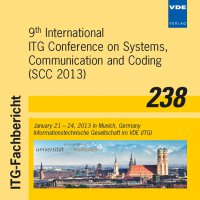Comparison of Equivocation Rate of Finite-Length Codes for the Wiretap Channel
Conference: SCC 2013 - 9th International ITG Conference on Systems, Communication and Coding
01/21/2013 - 01/24/2013 at München, Deutschland
Proceedings: SCC 2013
Pages: 6Language: englishTyp: PDF
Personal VDE Members are entitled to a 10% discount on this title
Authors:
Wickramasooriya, Anuradha; Land, Ingmar; Subramanian, Ramanan (Institute for Telecommunications Research, University of South Australia)
Abstract:
This paper addresses the analysis of binary linear codes for the wiretap channel with focus on binary erasure channels. We use a novel approach to measure the equivocation rate by analysing the generator matrix of the eavesdropper’s code. We show that a high level of secrecy is achievable by using finite-length low-density parity-check (LDPC) codes for the case where the main channel is noiseless. For the case where the main channel is noisy, we propose a code construction using nonsystematic codes. We also analyse the relationship between the bit error rate and the equivocation rate for this case. The analysis shows that maximum bit error rate does not imply maximum equivocation, and thus does not necessarily provide informationtheoretic security.


